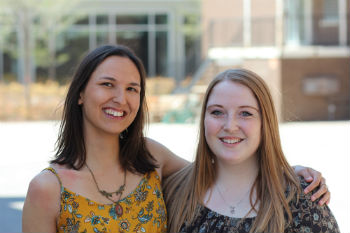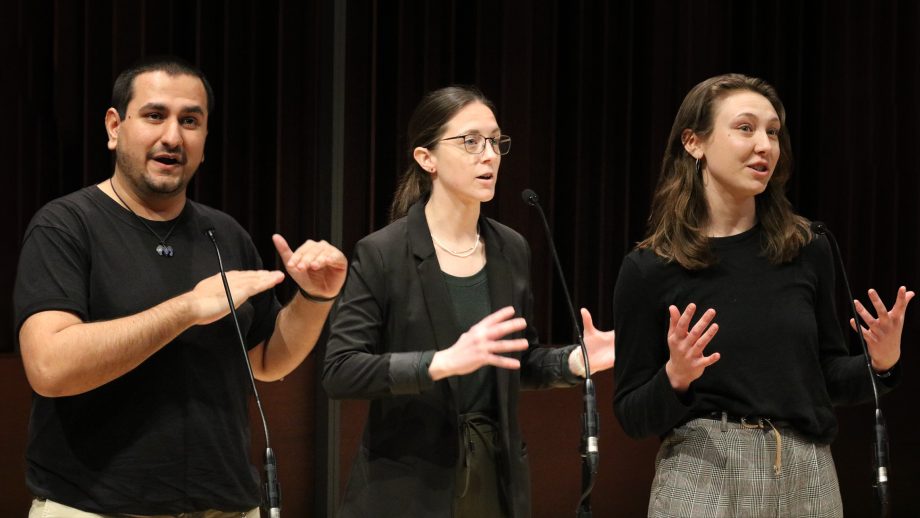
clockwise, Drs. Jeffery Martin, Sheela Ramanna, Mirjana Roksandic, Athar Ata, Narad Rampersad, Russell Mammei, Shakhawat Hossain, Jamie Ritch, Caleb Hasler, Blair Jaimison, ©UWinnipeg
WINNIPEG, MB – The University of Winnipeg received research and scholarship funding from the Natural Sciences and Engineering Research Council of Canada (NSERC) that will enable over $3 million in research projects. This funding comes via the Discovery Grants Program, Research Tools and Instruments (RTI) Program, and the Canada Graduate Scholarships-Master’s (CGSM) program.
“Our researchers are making important contributions to scientific discoveries in Canada and abroad,” said Dr. Jino Distasio, Vice-President, Research and Innovation. “This year our researchers received funding through a variety of NSERC programs, including Dr. Mirjana Roksandic’s Discovery Accelerator Supplement, which reflects the strength of our innovative research programs.”
UWinnipeg’s physics researchers got a $1,800,000 boost in Subatomic Physics Discovery Grants. Dr. Russell Mammei will receive $150,000 for The Nab Experiment: An ultraprecise measurement of the electron-antineutrino angular correlation coefficient in neutron beta decay and Dr. Jeffrey Martin will receive $1,650,000 for the Ultracold Neutron Electric Dipole Moment Experiment. Dr. Blair Jamieson also received a Subatomic Physics Major Resource Support grant, valued at $221,445 over three years, to support detector mechanics and electronics for subatomic physics experiments.
Discovery Grants were awarded to six UWinnipeg researchers for a five-year period. The faculty members receiving these grants, which total $740,000, are (in alphabetical order), Dr. Caleb Hasler, biology, Organismal responses of freshwater fish to elevated carbon dioxide; Dr. Shakhawat Hossain, mathematics and statistics, Penalty, non-penalty shrinkage and ensemble methods for low and high dimensional data; Dr. Sheela Ramanna, applied computer science, Tolerance-based Granular Computing Methods in Learning: Foundations and Applications; Dr. Narad Rampersad, mathematics and statistics, Avoiding Generalized Repetitive Patterns in Words; Dr. Jamie Ritch, chemistry, Exploring the Molecular Chemistry of Selenium an dTellurium; and Dr. Mirjana Roksandic, anthropology, At the Crossroads of Europe and Asia: Human evolution in the Central Balkans.
Roksandic also received the prestigious Discovery Accelerator Supplements, valued at $120,000; Hasler was also given Discovery Launch Supplements funding, valued at $12,500 — in addition to Discovery Grants.
Discovery Development Grants were awarded to two researchers for a two-year period: Dr. Yangjun Chen, applied computer science, On the reachability and graph matching in graph databases; and Dr. Nicolino Pizzi, mathematics and statistics, An approximate reasoning strategy for entity resolution and relationship discovery using voluminous mast data aggregates.
Other funding includes the Research Tools and Instruments Grants for Dr. Athar Ata, chemistry, for a mass spectrometer for chemistry research valued at $121,000.
UWinnipeg received two NSERC Canada Graduate Scholarships for students in the Masters of Science in Bioscience, Technology & Public Policy program — Jamie Card, who is working with Dr. Caleb Hasler, and Rebecca Carter who is working under the supervision of Dr. Susan Lingle.
The University of Winnipeg gratefully acknowledges the funding received from the Government of Canada Research Support Fund in aid of research infrastructure. Every year, the federal government invests in research excellence in the areas of health sciences, engineering, natural sciences, social sciences, and humanities through its three granting agencies. The Research Support Fund (RSF) reinforces this research investment by helping institutions ensure that their federally funded research projects are conducted in world-class facilities with the best equipment and administrative support available. Please visit Research Support Fund.





